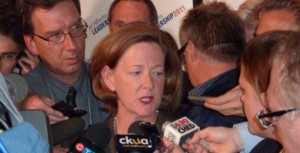(January 25, 2016) After Harper and Ritz killed the Wheat Board their ideological cousins in Alberta and Saskatchewan set up new farmer-funded Commissions to look after farmers’ interests. Three years ago Alberta created the Alberta Wheat Commission (AWC) while Saskatchewan’s Wheat Development Commission (SWDC) has been up and running for a bit more than two years as has the Saskatchewan Barley Development Commission (SBDC). All of them were modelled on the venerable Alberta Barley Commission (ABC).
Manitoba took a more economical route by establishing a combined wheat and barley commission in mid-2014. It has not been running long enough to establish a pattern of expenditures. So for now, we can focus on comparing the corporate cultures of the four check-off organizations in Saskatchewan and Alberta. Since the Alberta Wheat Commission’s (AWC) 2015 audited statement is not available as of January 21, this article is based on the 2014 Audited Statements.
Readers may recall that in both Alberta and Saskatchewan every farmer who grows wheat and barley pays a production tax (innocuously called a “levy”) which is given to the relevant Commission. Alberta farmers paid the AWC $6 million, and the ABC $2.7 million for a total of just over $8.7 million in 2014. Saskatchewan farmers paid the SWDC $6.3 million and the SBDC $820 thousand for a total of $7.2 million dollars that year.
In Saskatchewan each levy paying farmer receives a ballot in the mail to elect the Commission’s Board of Directors. On the other hand, in Alberta all it takes to get elected is a car load of friends showing up at a remote meeting – elections are not conducted with mail-in ballots so that they are accessible to every farmer who pays the levy. It comes as no surprise there are stark contrasts between the democratically elected Commissions in Saskatchewan and Alberta’s crony models.
Living Large: Staff
According to its audited statement Alberta’s Wheat Commission supports a staff complement of 12 people, five of whom are shared with the Alberta Barley Commission which has an additional 4 staff of its own. The Wheat Commission spent $539 thousand on salaries while the Barley Commission spent $764 thousand.
In contrast the 2014 Saskatchewan Wheat Commission had just four staff and spent a mere $156 thousand on wages and benefits while SBDC spent $89 thousand on service contracts for the equivalent of just one and a quarter full time staff.
Living Large: Publications
Much of the Alberta Wheat Commission staff seems to be devoted to telling growers just how great the AWC is with a ‘grower relations’ person in addition to two communications people, one of whom is also given the title of ‘events coordinator.’
In the AWC’s audit if you add up the lines for Communications $296,278.00, Meeting $169,588.00, and Administrative $161,712.00, these amount to $627,578.00 or about 20% of their Budget Expenditures. If you add in the very broad Market Development category of $813,373.00 a whopping 40% of the AWC’s expenditures go to these items before a single seed is planted or scientist funded.
Presumably a good time is had by all, but just in case farmers footing the bills missed going on that last Asian junket the AWC/ABC produces a glossy magazine published four times a year. It costs a tidy $60,000.00 per issue plus the staff time of both a managing editor and a sales and production coordinator. Advertising off-sets only about 8% of the magazine’s cost. At this point farmers paying the AWC/ABC check offs might be wondering if paying for this magazine and effectively subsidizing companies advertising to them is really the best use of their money.
This reflects the Alberta Conservative tradition of lavish spending on propaganda. Under Premier Ralph Klein and his successor administrations the government’s “Public Affairs Bureau” censored all Government-issue communications from Cabinet Ministers down to the lowliest dog catcher. Dubbed variously “the Ministry of Truth” or “Edmonton’s Pravda,” it was said to cost more and have more staff than the same department in the White House for the President of the United States.
So it is no surprise the corporate culture of the Klein era carries over into the Alberta Wheat and Barley Commissions. In fact the top check-off commissions in Alberta took a total of $31 million dollars from Alberta farmers in 2014.
Contrast this with the lean but not mean staff at the Saskatchewan Wheat Development Commission. In 2014 the SWDC Board of Directors increased their staff from three to four with the hiring of a Research Program Manager. A good hire since the whole point of these commissions was to fund agronomic research.
SWDC publishes three simple newsletters a year heavy on text and agronomic information about things like the development of wheat cultivars resistant to fusarium and evidence-based responses to economic and customer quality concerns.
Living Large: Travel
Speaking of Alberta corporate culture, the dizzying international travel of the Alberta Wheat Commission people reminds this writer of the Alison Redford era in Alberta – except she mostly flew around Alberta. In 2014 AWC staff and directors traveled to Venezuela, Colombia, Chile, China, Singapore, Malaysia, Thailand, Vietnam, Indonesia, England, Spain, Italy, Germany, Algeria, Tunisia, Morocco, and the United Arab Emirates. Perhaps this travel schedule explains why the Alberta Wheat Commission spent less than one third of its expenditures on research.
In contrast the wild bunch at the Saskatchewan Wheat Development Commission toured research facilities like the Crop Development Centre at the University of Saskatchewan, and the Kernan Crop Research Farm in Saskatoon. They also took a southern trip but it was to the Semiarid Prairie Agricultural Research Centre near Swift Current, Saskatchewan. This shows the SWDC is laying the ground work for supporting real world research into wheat at recognized scientific institutions on the prairies.
Without a complete house cleaning and forensic audit of the activities of the various Alberta check-off commissions, it would at least be refreshing to see the new Alberta Government revamp the Alberta commissions and enforce democratic elections which are open to all farmers not just the ones who have the free time to travel to distant meetings to get elected by their friends.




Great work Ken. That is a pretty poor performance compared to when the CWB was getting farmers another 3 to 4 dollars a bushel at a total administration cost of 10 cents a bushel all in. Shame Shame!